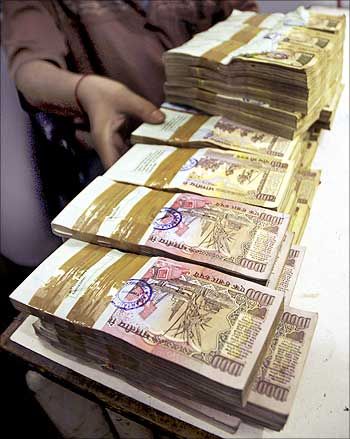
The non-starter Rs 30,000-crore (Rs 300 billion) divestment programme of the government got a little boost towards the close of the year bringing cheer to policy makers and raising hopes that it might inch closer to the ambitious target during the remaining three months of 2012-13.
After several aborted attempts, the government offloaded the shares of Hindustan Copper in November -- the first divestment of the current financial year of 2012-13.
It fetched the government Rs 808 crore, with bulk of the equity being purchased by the state-run banks and LIC.
However, the big one was NMDC stake sale in December, yielding Rs 6,000 crore. It also generated interest among foreign investors, raising expectations that state-owned financial institutions will not have to bail out the PSU stake sale programme of the government.
...

The pipeline for divestment is quite long and includes over 10 blue chip companies such as NTPC, BHEL, Sail, MMTC and Oil India.
Although there was a long lull before it, the year 2012 began with the offloading the shares of oil major ONGC. The issue was subscribed 98.3 per cent and the government raised Rs 12,767 crore through auctioning of shares in March.
Besides, initial public offer (IPO) of NBCC helped the government to realise Rs 154 crore in April.
The year saw disinvestment, which had a host of bluechip PSU lined up for selling minority stake of government, getting marred by controversies as retail and institutional stayed away from bidding citing high prices.
The NMDC issue, which happened after the new Secretary D K Mittal who took over the charge of divestment department, was the only issue in 2012 which was lapped up by foreign institutions.
...

The two earlier issues of bluechip companies -- ONGC and HCL -- had failed to garner institutional and retail investor interest.
Trying to boost disinvestment, market regulator Sebi introduced the concept of offer for sale (OFS) or auction route in January to facilitate share sale of PSUs and also help achieve the minimum 25 per cent public shareholding norms by June 2013.
Under the OFS route, institutions can put in their bids over the floor price fixed by the government.
However, the Finance Ministry is now working on more innovative methods, like floating PSU Exchange Traded Fund (ETF) to carry forward the disinvestment drive and has floated a Cabinet note in this regard.
...

The auction route or offer for sale route (OFS) as allowed by market regulator Sebi saw some technical glitches initially which brought about some confusion regarding the ONGC share sale subscription.
While the government was optimistic about the success of the auction route, the first issue of 2012, ONGC, bombed on
the stock exchanges amidst high drama, with the 98 per cent of the issue getting subscribed finally. Of this, Life Insurance Corporation (LIC) bid for the 84 per cent of the issue.
The Parliamentary Standing Committee of Finance, headed by senior BJP leader Yashwant Sinha, criticised the disinvestment programme saying that the government was using state-owned companies as "milching cows" to bridge deficit.
It said divestment was nothing but mere "financial engineering" and that the government tried to "shift money from one pocket to the other".
...

The state-run LIC and financial institutions had to come in for the rescue at the last moment, which helped the high profile issues of ONGC and Hindustan Copper (HCL) to barely scrape through.
In the 2012-13 Budget, the government had planned to raise Rs 30,000 crore through disinvestment in PSU.
This was lower than Rs 40,000 crore envisaged in 2011-12. While the government had managed to raise about Rs 14,000 crore in 2011-12 fiscal, so far in the current fiscal it has managed to raise over Rs 6,900 crore.
Paving the way for further stake sale, the government has already identified a host of companies for disinvestment, including Hindustan Aeronautics and Rashtriya Chemical.
With only about three months left for the current financial year, the government will have to work overtime to achieve the Rs 30,000 crore disinvestment target.